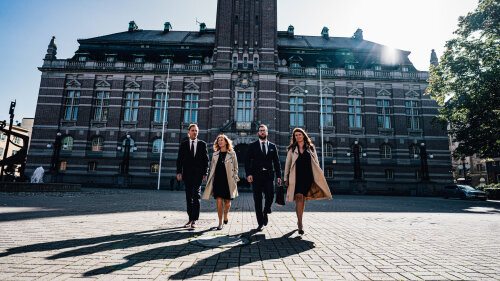Best Juvenile Law Lawyers in Norrköping
Share your needs with us, get contacted by law firms.
Free. Takes 2 min.
List of the best lawyers in Norrköping, Sweden
About Juvenile Law Law in Norrköping, Sweden
Juvenile law in Norrköping is governed by Swedish national legislation that gives children and young people extra protections and tailored interventions. The rules apply across Sweden, but your case will be handled locally by authorities and courts in Norrköping and Östergötland County. If a young person is suspected of a crime, special procedural safeguards and youth-focused sanctions apply. If there are concerns about a child’s safety or well-being, social services can offer voluntary support or, in serious situations, seek compulsory care. Family law disputes involving children are decided with the best interests of the child as the guiding principle.
Key actors include Norrköping Social Services, the Police, the Prosecution Authority, Norrköping District Court, and the Administrative Court in Linköping. Many cases involve appointed public counsel so that children and guardians receive legal support throughout the process.
Why You May Need a Lawyer
A lawyer can help you understand your rights, speak for you in meetings and hearings, and protect your child’s interests. Common situations where legal help is important include:
- Police investigation of a child aged 15-17 suspected of a crime, including police interviews and searches.- Decisions about detention, restrictions, or remand of a minor, which are rare but possible in serious cases.- Prosecution decisions that may lead to youth sanctions such as youth service, youth care, youth supervision, or closed youth care.- When social services consider compulsory care under LVU if a child is at risk in the home or is harming themselves through abuse, crime, or other destructive behavior.- Emergency LVU measures when a child is taken into immediate care and a quick court review follows.- Family law disputes about custody, residence, or contact, including social services investigations and court proceedings.- When a child is a victim of crime and needs a special representative or injured party counsel to act on their behalf.- Appeals of administrative or criminal decisions, including challenging or modifying existing measures or sanctions.- Seeking legal aid or insurance-based legal cover for advice and representation.
Local Laws Overview
Sweden’s national laws apply in Norrköping, with local authorities carrying out decisions:
- Age of criminal responsibility is 15. Children under 15 cannot be prosecuted, but social services can intervene under the Social Services Act SoL and, if needed, LVU.- Young offenders aged 15-17 are covered by LUL, which provides extra safeguards during investigation and trial. Guardians are notified, a public defender is usually appointed, and social services must be involved early.- Youth sanctions focus on rehabilitation. Courts may order youth service ungdomstjänst, youth care ungdomsvård, youth supervision ungdomsövervakning, or closed youth care sluten ungdomsvård under LSU for the most serious cases. Fines and other adult sanctions are less common for minors.- Detention and remand for under-18s are strictly limited and used only when necessary. Alternatives are considered first, and any restrictions must be proportional and reviewed frequently.- LVU allows compulsory care for children and young people up to 20 years if there is serious risk due to conditions in the home or the young person’s own behavior. The Administrative Court in Linköping decides LVU cases, and an urgent immediate care order can be made by social services then reviewed by the court quickly.- In family law under the Parental Code FB, custody, residence, and contact decisions rest on the best interests of the child. Norrköping Social Services can facilitate cooperation talks and conduct home investigations for the court.- Professionals in schools, healthcare, and other services have a duty to report suspected child harm to social services. Confidentiality and secrecy rules apply, but safety comes first.- A child victim may be assigned injured party counsel målsägandebiträde or a special representative for children särskild företrädare för barn when a guardian cannot safeguard the child’s interests. Police interviews with child victims often occur at Barnahus in a child-friendly setting.- Criminal records for youths are subject to special deletion rules gallring in the criminal records registry. Time limits depend on the type of sanction and age at the time of the offense.
Frequently Asked Questions
What is the age of criminal responsibility in Sweden?
It is 15. Children under 15 cannot be prosecuted. Social services may still assess needs and provide support or seek protective measures if necessary.
What happens if my child is called to a police interview in Norrköping?
Guardians are usually notified and can attend unless it could harm the investigation. A public defender is often appointed for a suspect aged 15-17. Social services are involved early. The child has the right to remain silent and to have a lawyer present.
Will my child get a public defender?
In most youth criminal cases a public defender offentlig försvarare is appointed for suspects aged 15-17. Ask the police or prosecutor to request one if it has not happened. If your child is a victim, injured party counsel may be appointed depending on the offense.
Can my child be detained or remanded?
Detention of minors is restricted and must be necessary and proportionate. Courts consider alternatives first. If remand is ordered, it is reviewed frequently, and special protections apply. For the most serious sentences a court may impose closed youth care instead of prison.
What is LVU and when is it used?
LVU is the Care of Young Persons Act allowing compulsory care for children and youths up to age 20 when there is a serious risk to health or development. It applies if problems at home or the youth’s own behavior create significant danger and voluntary measures are not enough.
Who decides LVU cases and how fast can emergency care happen?
Norrköping Social Services can make an immediate care decision in urgent situations. The Administrative Court in Linköping then reviews it quickly. For non-urgent cases, social services apply to the court, which holds a hearing before deciding. Public counsel is normally appointed for the child and guardians.
What sanctions can a 15-17 year old receive if convicted?
Common sanctions are youth service, youth care with a treatment plan, youth supervision with structured control and support, fines, or in serious cases closed youth care at a SiS special youth home. The aim is rehabilitation and reducing reoffending.
What are my rights as a guardian during investigations and hearings?
You are usually notified and can attend key interviews and hearings unless restricted for investigation reasons. You have the right to be heard, to access relevant information subject to confidentiality rules, and to legal representation in many proceedings.
How do appeals work in juvenile matters?
LVU decisions from the Administrative Court can be appealed to the Administrative Court of Appeal and, in limited cases, to the Supreme Administrative Court. Criminal judgments from Norrköping District Court can be appealed to the Court of Appeal. Strict deadlines apply, so consult a lawyer promptly.
My child is a victim of crime. What support is available?
A child victim may receive injured party counsel and, if a guardian cannot protect the child’s interests, a special representative for children who can make decisions about the legal process. Police interviews are usually held in child-friendly settings such as Barnahus, and support services can be coordinated through social services.
Additional Resources
- Norrköping Social Services Socialtjänsten - Child and Youth Services for advice, assessments, voluntary support, and LVU applications.- Social Emergency Service Socialjour for urgent child protection outside office hours. In an emergency, call 112.- Norrköping Police Polisen for reporting crimes and coordinating youth investigations. Non-emergency police number is 114 14.- Swedish Prosecution Authority Åklagarmyndigheten - Norrköping Prosecution Chamber for prosecution decisions and diversion options for youths.- Norrköping District Court Norrköpings tingsrätt for youth criminal cases and family law matters.- Administrative Court in Linköping Förvaltningsrätten i Linköping for LVU and other administrative child protection cases.- National Board of Institutional Care SiS for closed youth care and certain LVU placements.- Health Care Advice 1177 for non-urgent medical guidance related to children and adolescents.- BRIS - Children’s Rights in Society. Child helpline 116 111.- Crime Victim Support Brottsofferjouren for emotional support and practical guidance to victims and families.
Next Steps
- Prioritize safety. If a child is in immediate danger, call 112. For urgent but non-emergency police matters, call 114 14. For urgent social concerns outside office hours, contact the social emergency service Socialjour.
- Get early legal advice. Ask for a public defender in youth crime cases or a public counsel offentligt biträde in LVU matters. In family disputes, explore legal aid rättshjälp or legal expenses coverage rättsskydd through your home insurance.
- Prepare information. Keep a timeline of events, names of professionals involved, school records, medical notes, and any messages or social media evidence. Bring ID and any prior decisions or agreements.
- Use your rights at interviews. Do not let a child be interviewed without understanding their rights. Request that a lawyer attend. Ask for an interpreter if needed. You and your child have the right to have questions asked in an age-appropriate way.
- Engage with social services. Cooperate with assessments and proposed voluntary measures when safe and appropriate. If you disagree with a decision, discuss it with your lawyer promptly to consider objections or appeals.
- Follow deadlines. Appeals in both administrative and criminal cases have short time limits. Your lawyer can file the appeal and request interim measures if appropriate.
- Focus on support. Alongside legal steps, seek school, healthcare, and counseling support for your child. Structured help can influence legal outcomes and improve well-being.
This guide is general information. Always consult a qualified lawyer in Norrköping for advice on your specific situation.
Lawzana helps you find the best lawyers and law firms in Norrköping through a curated and pre-screened list of qualified legal professionals. Our platform offers rankings and detailed profiles of attorneys and law firms, allowing you to compare based on practice areas, including Juvenile Law, experience, and client feedback.
Each profile includes a description of the firm's areas of practice, client reviews, team members and partners, year of establishment, spoken languages, office locations, contact information, social media presence, and any published articles or resources. Most firms on our platform speak English and are experienced in both local and international legal matters.
Get a quote from top-rated law firms in Norrköping, Sweden — quickly, securely, and without unnecessary hassle.
Disclaimer:
The information provided on this page is for general informational purposes only and does not constitute legal advice. While we strive to ensure the accuracy and relevance of the content, legal information may change over time, and interpretations of the law can vary. You should always consult with a qualified legal professional for advice specific to your situation.
We disclaim all liability for actions taken or not taken based on the content of this page. If you believe any information is incorrect or outdated, please contact us, and we will review and update it where appropriate.









